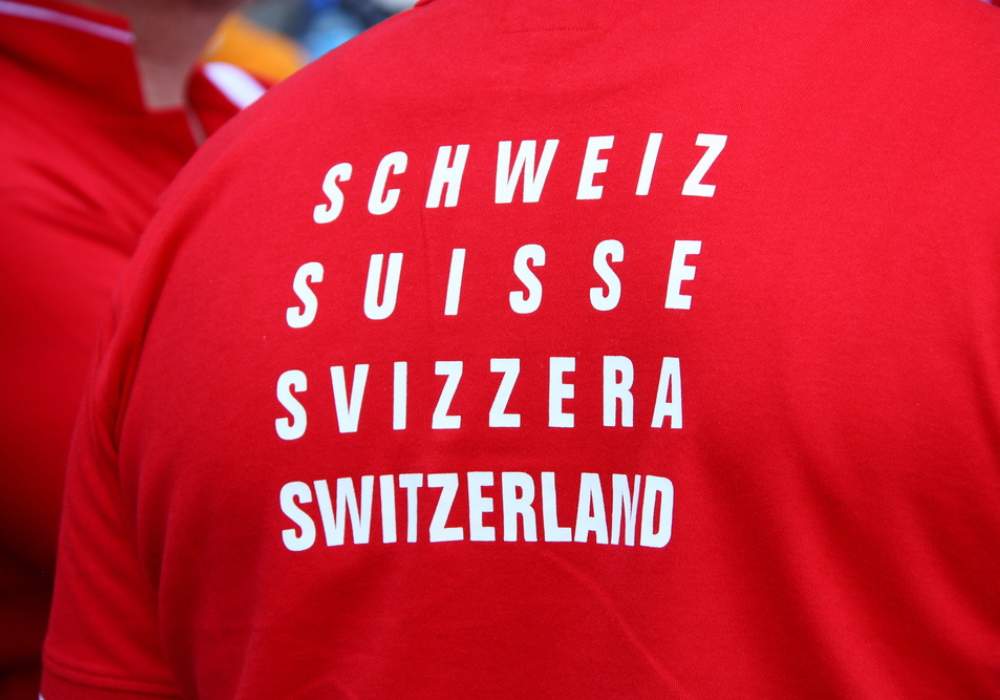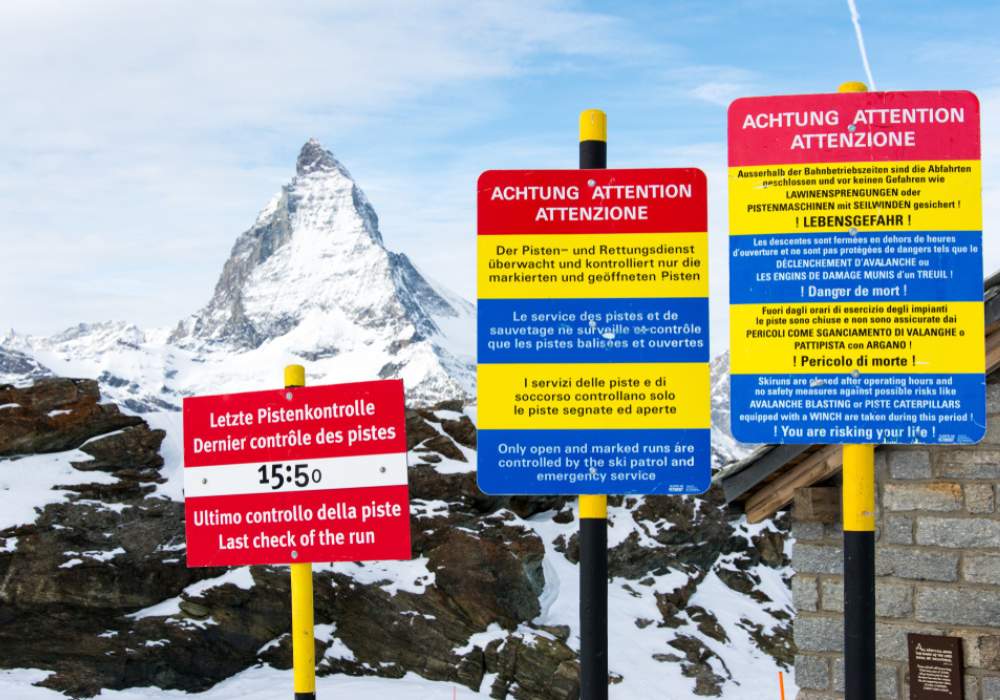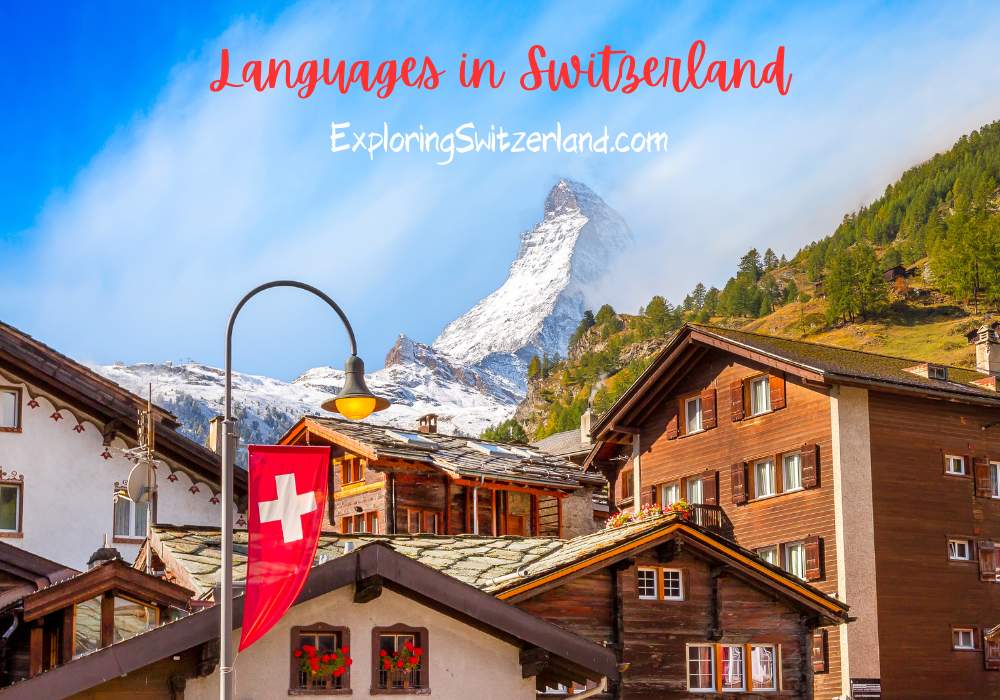SWISS LANGUAGES
Switzerland is an amazing travel destination – but when it gets to Swiss languages, it might be confusing. As a traveler, you will need to know about the languages in Switzerland and you might be surprised to hear that there are a couple of official languages in the country with less than nine million inhabitants.
Switzerland is home to four official languages: German, French, Italian, and Romansh. All four of these languages are recognized as the national languages in Switzerland.
Most Swiss people speak one of these languages as their mother language and learn one or two languages at school (besides English).
GENERAL INFO ON SWISS LANGUAGES
German is by far the most common language spoken in Switzerland, with about 65% of the population speaking it. Swiss German is the most common dialect and it is spoken throughout the country. French is spoken by about 23% of the population, mainly in western Switzerland.
Italian is spoken by 8%, primarily in the southern cantons of Ticino and Graubünden. Finally, Romansh is a Rhaeto-Romance language that is spoken by less than 1% of the population in Graubünden.
Switzerland also has a number of non-official languages spoken by immigrants and visitors, including English, Spanish, Portuguese, Albanian, and Serbo-Croatian. English is mainly spoken in business and international circles due to the country’s strong economic ties to the UK and the US.
Switzerland is a highly diverse country and the various language communities are an important part of its identity. The citizens of Switzerland are proud of their linguistic heritage and value each of the official languages equally.
This diversity is seen in both everyday life and popular culture, with radio stations broadcasting programs in several languages and newspapers being printed in multiple languages.

OFFICIAL LANGUAGES IN SWITZERLAND
Let´s find out a bit more about languages in Switzerland.
German-Speaking Switzerland
Swiss German is the most commonly spoken language in Switzerland. It is a dialect of High German and is spoken by about 65% of the population, primarily in eastern and central Switzerland.
Swiss German can be divided into several distinct dialects, including Alemannic, Schwyzerdütsch, and Zurich German. Swiss German also has its own vocabulary, with words and phrases that are distinct from the standard High German that is most commonly spoken in Germany, Austria, and Switzerland.
I have to admit that I – even having spent more than 18 months in Switzerland – hardly understand Swiss German. Communication still works fine though because most understand the High German that I speak – even in the areas that do not speak German as the main language.
I am aware that I should bury my head in shame though for my lack of understanding and speaking in Swiss German. Do not be like me, learn some proper Swiss German words.

French-Speaking Switzerland
French is spoken by about 23% of the population, mainly in western Switzerland. French was once the language of power in Switzerland, but it has since been overtaken by German in terms of its usage.
French is primarily spoken in the canton of Geneva, as well as in the adjacent parts of Valais and Vaud. There are also pockets of French-speaking communities scattered throughout western Switzerland.
Italian-Speaking Switzerland
Italian is spoken by 8%, mostly in the south, primarily in the cantons of Ticino and Graubünden. Italian is the only official language of Ticino, while Romansh is also officially recognized.
Italian dialects are spoken throughout the region, with local varieties varying greatly from one area to another.
Romansh-Speaking Switzerland
Romansh is a Rhaetian language that is spoken by less than 1% of the population in Graubünden. It is one of four official languages, along with German, French, and Italian.
Romansh has several dialects, including Sursilvan, Surmiran, Puter, and Vallader, which are widely spoken throughout Graubünden.

Language Learning Opportunities in Switzerland
Switzerland offers many learning opportunities for language learners.
Primary education in Switzerland consists of both public and private schools, with instruction provided in one or more of the country’s four official languages (German, French, Italian, and Romansh) depending on a student’s region.
Swiss secondary education is divided into three tiers: upper secondary education, post-secondary non-tertiary education, and tertiary education.
Both upper secondary and post-secondary non-tertiary levels offer language learning classes in French and German, as well as Italian or Romansh, depending on the student’s region.
Vocational training is also widely available with instruction in one of the country’s four official languages. Switzerland has a range of private language schools and institutions that offer both general and specialized language courses for learners of all ages and levels.
Additionally, there are many universities in Switzerland that offer bachelor’s, master’s, and doctorate programs in the country’s official languages.
In addition to formal education options, Switzerland also offers a wide range of informal language learning activities, such as extracurricular classes, adult education programs, and private tutoring services. The country’s four official languages are also taught in many different settings, including language schools, universities, community centers, churches, libraries, and online courses.
Learning one of the main languages in Switzerland can be a good idea. Just be aware that you might not understand everything if you leave the comfort of your classroom and people speak in their dialects.
Whether a learner is interested in formal or informal language courses, the country offers a variety of options for learners of all ages and levels. With its rich multilingual culture, Switzerland provides an exciting environment for any language enthusiast.
The benefits of learning one of the official languages in Switzerland are numerous; from gaining access to new culture and literature to improving communication skills and gaining a better understanding of the country’s heritage.
Additionally, there are numerous resources available for further research and information on the Swiss language.
Therefore, learning one or more of Switzerland’s official languages can be an enjoyable, rewarding experience that will provide insight into the culture and people of this beautiful country.
With its diverse linguistic landscape and language learning opportunities, Switzerland is a great place to begin or continue your language journey.
FINAL THOUGHTS ON LANGUAGES SPOKEN IN SWITZERLAND
Switzerland is definitely an interesting place when it comes to languages! With four official languages and several others widely spoken, you’re bound to hear something new each day.
Even if you never become fluent in one of the official languages, there are still all sorts of bilingual endeavors that you could take part in.
Whether it’s attending a bilingual event or following Swiss news in two languages, Swiss language culture is something that won’t disappoint even the casual traveler — especially if they come prepared with just a few basic words and phrases.
With all this in mind, I’m sure that taking a chance to explore Switzerland can be a truly enriching experience for any language lover!
